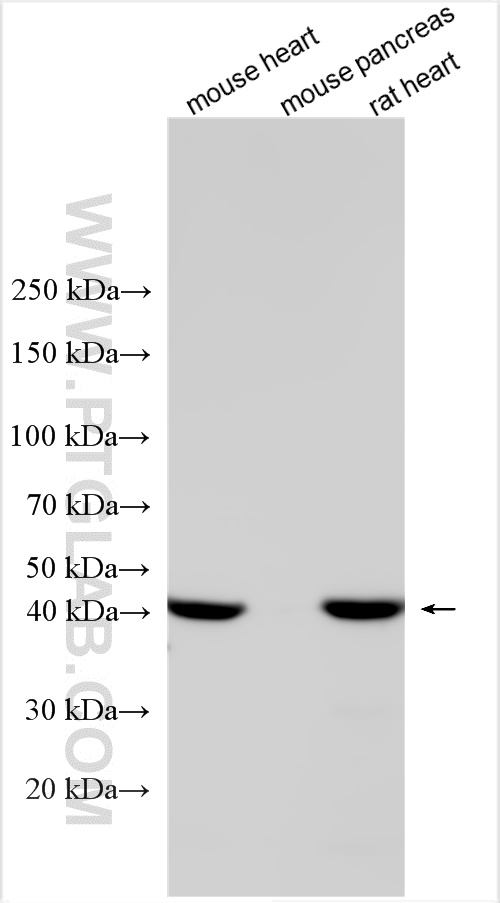验证数据展示
经过测试的应用
| Positive WB detected in | mouse heart tissue, rat heart tissue |
推荐稀释比
| 应用 | 推荐稀释比 |
|---|---|
| Western Blot (WB) | WB : 1:1000-1:6000 |
| It is recommended that this reagent should be titrated in each testing system to obtain optimal results. | |
| Sample-dependent, Check data in validation data gallery. | |
产品信息
17522-1-AP targets Alpha cardiac muscle actin specific in WB, ELISA applications and shows reactivity with human, mouse, rat samples.
| 经测试应用 | WB, ELISA Application Description |
| 经测试反应性 | human, mouse, rat |
| 免疫原 |
Peptide 种属同源性预测 |
| 宿主/亚型 | Rabbit / IgG |
| 抗体类别 | Polyclonal |
| 产品类型 | Antibody |
| 全称 | actin, alpha, cardiac muscle 1 |
| 别名 | Actin-cardiac-muscle-1-Specific, ACTC1, Alpha actin, ACTC, ACTC 1 |
| 计算分子量 | 42 kDa |
| 观测分子量 | 42 kDa |
| GenBank蛋白编号 | NM_005159 |
| 基因名称 | ACTC1 |
| Gene ID (NCBI) | 70 |
| 偶联类型 | Unconjugated |
| 形式 | Liquid |
| 纯化方式 | Antigen affinity purification |
| UNIPROT ID | P68032 |
| 储存缓冲液 | PBS with 0.02% sodium azide and 50% glycerol, pH 7.3. |
| 储存条件 | Store at -20°C. Stable for one year after shipment. Aliquoting is unnecessary for -20oC storage. |
背景介绍
Actins are highly conserved proteins that are involved in various types of cell motility and are ubiquitously expressed in all eukaryotic cells. The ACTC1 gene encodes cardiac muscle alpha-actin, the predominant actin isoform in adult heart, which interacts with a variety of proteins to produce the force for muscle contraction. This antibody is specific to the ACTC1. It does not cross-react with other actin isoforms.
实验方案
| Product Specific Protocols | |
|---|---|
| WB protocol for Alpha cardiac muscle actin specific antibody 17522-1-AP | Download protocol |
| Standard Protocols | |
|---|---|
| Click here to view our Standard Protocols |


